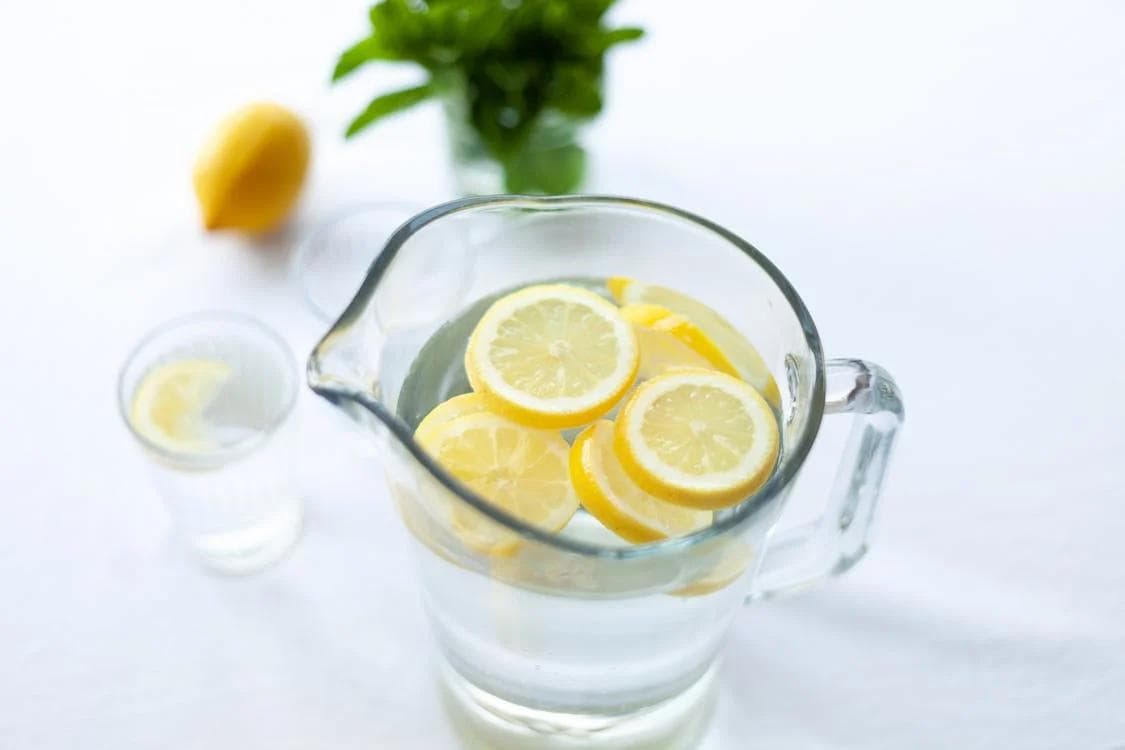Water really is the stuff of life. You can go weeks without food - but just a few days without water and things start to go seriously downhill. It keeps everything ticking over, from your brain and mood to your muscles and energy levels.
But how much should you actually be drinking? Are you getting enough, and would you even know if you weren't?
In this blog, we dive into why hydration matters, how to spot the signs of dehydration, and the easiest ways to stay topped up - especially when the sun's out or you're on the move. hi
The function of water in the body
One of the main reasons that it's so important for us to drink enough water is because we're basically made up of more than half water! The human body contains up to 75% water, depending on our age and gender - around 75% in infants and around 55% in older people - which helps to explain why water is so essential within our bodies.
Water helps to support multiple important bodily functions ( 1, 2), such as:
- Regulating body temperature
- Moistens tissues in the eyes, nose and mouth
- Protects body organs and tissues
- Electrolyte balance
- Carries nutrients and oxygen to cells
- Blood pressure regulation and cardiovascular health
- Lubricates joints, which help to make physical movement and exercising more comfortable
- Supports digestive function and regularity
- Skin health and hydration - skin is 30% water
- Lessens the burden on the kidneys and liver by flushing out waste products
- Helps dissolve minerals and nutrients to make them accessible to your body
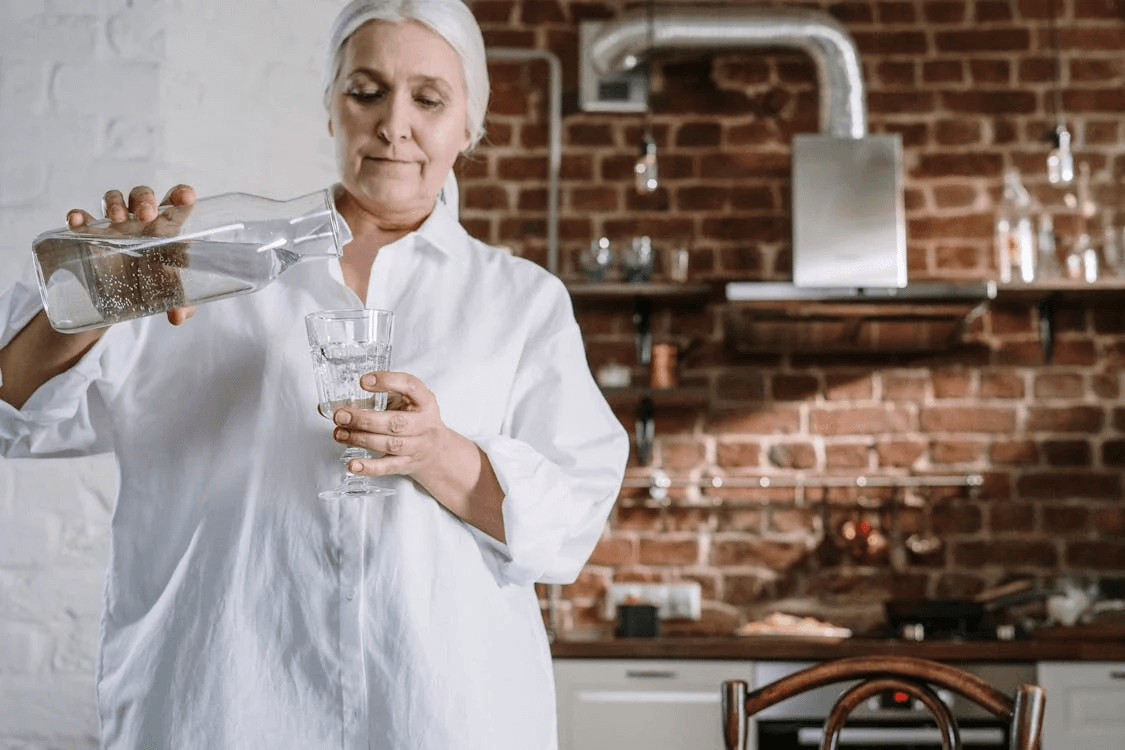
How much water should you drink each day?
The daily recommended intake of water for adults is around 6-10 200ml glasses of water per day, which is around 1.5 litres, though some guidelines suggest that 2-3 litres daily is more desirable. ( 3, 4 ). Though these recommendations may vary, we do know that it's very important to be well-hydrated; however, fluid requirements will vary from person to person due to a variety of factors. (5)
- Age
Our hydration needs vary according to our age. Babies are 75% water and initially have a completely liquid diet! Children should have around 5-8 cups a day, depending on their age. Once we reach adulthood, our needs stabilise and remain the same, but may vary according to our lifestyle.
- Weight
Our water needs will also depend on our overall body mass, with larger individuals needing to consume more than those with a lower body weight.
- Exercise
A sedentary person will need to drink less fluid than someone who exercises daily and loses moisture through perspiration..
- Climate
Living in a hot climate will increase our needs for water, as a lot of fluid will be lost as perspiration to keep the body cool
- Pregnancy
Women should consume around 300ml extra fluids daily whilst pregnant.
How do I know I'm drinking enough?
Well, it's time to put the pee in this public service announcement - check your urine! That's right, our urine is a clever little indicator of how our body is going in terms of fluid intake ( 6,7).
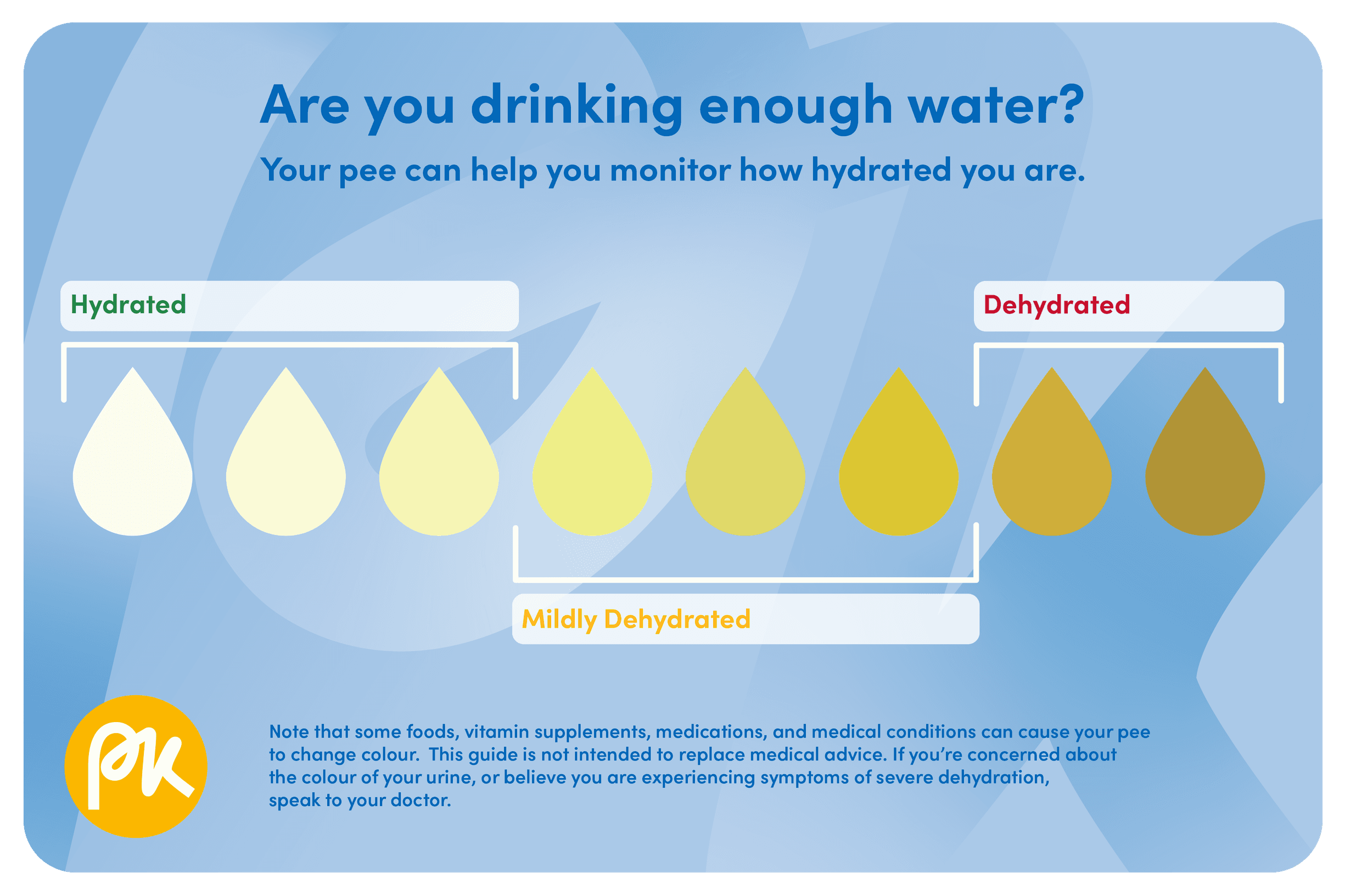
If your urine is pale or light in colour, this is a sign that you are getting adequate fluid intake, are well hydrated, and the amount of fluid that you are taking on board is sufficient. If the urine becomes darker, then you're probably not drinking enough and need to up your fluid intake. If your urine appears to be very dark in colour, you're unable to produce a lot of it, and it has developed a strong odour, then this is a sign that you are very dehydrated, and you must act quickly to replace the lost fluid. You may also need to replace electrolytes at this stage, so having a banana, some coconut water, or electrolyte sachets with your water can be a good idea. If you're experiencing other physical symptoms of dehydration (see the list in the next section), you should seek medical attention.
It's worth noting that certain foods, vitamin supplements, or medications can change the colour of your pee. Beetroot can cause it to be a little pink; asparagus can turn it a little green, and if you take supplements containing lots of B vitamins, your urine may appear bright yellow! These effects are usually short-lived and will disappear a few hours after consumption; however, if you regularly have dark coloured urine, or it appears to be another colour not featured on the chart, then speak to your doctor as certain medical conditions can also affect urine colour.
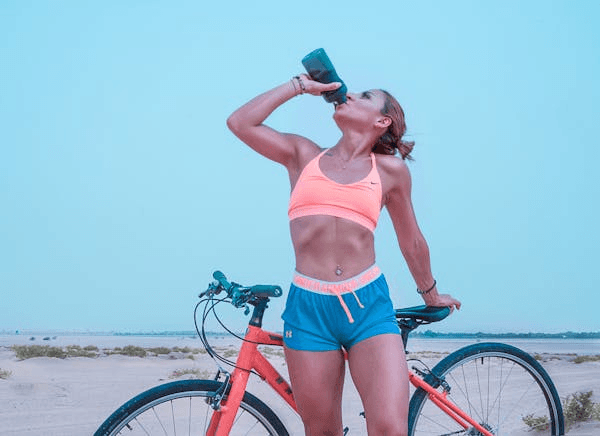
What are the signs of dehydration?
Dehydration is often spoken about, but what do we really know about it, and what is happening inside our bodies when we become dehydrated? Dehydration can be defined as "a decrease in total body water content due to fluid loss, diminished fluid intake, or both"( 8 ). Dehydration means your body is losing more fluid than it's taking in.
When our body's balance between water intake and fluid loss is disrupted then dehydration can set in, and if left untreated severe issues can develop such as impairment to the kidneys, seizures and a serious type of shock known as 'hypovolemic shock' resulting from a drop in blood pressure and the amount of oxygen in your body ( 9 ).
Symptoms of dehydration in adults and children include ( 10,11, 12):
- Feeling thirsty
- Dark yellow and strong-smelling pee
- Feeling dizzy or lightheaded
- Feeling tired
- Dry mouth, lips and eyes
- Peeing small amounts and fewer than 4 times a day
You are more prone to dehydration if you have:
- Drunk too much alcohol
- Diabetes
- Vomiting or diarrhoea
- Been in the sun too long (heatstroke)
- Sweated too much after exercising
- A high temperature of 38C or more
- Taking medicines that make you pee more (diuretics)
Anyone could run the risk of dehydration if they are not conscious about replacing the fluid they are losing in the body. Some individuals however are more at risk than others, particularly young children, commonly following illness with vomiting and diarrhoea, those with kidney disease or untreated diabetes and the elderly.
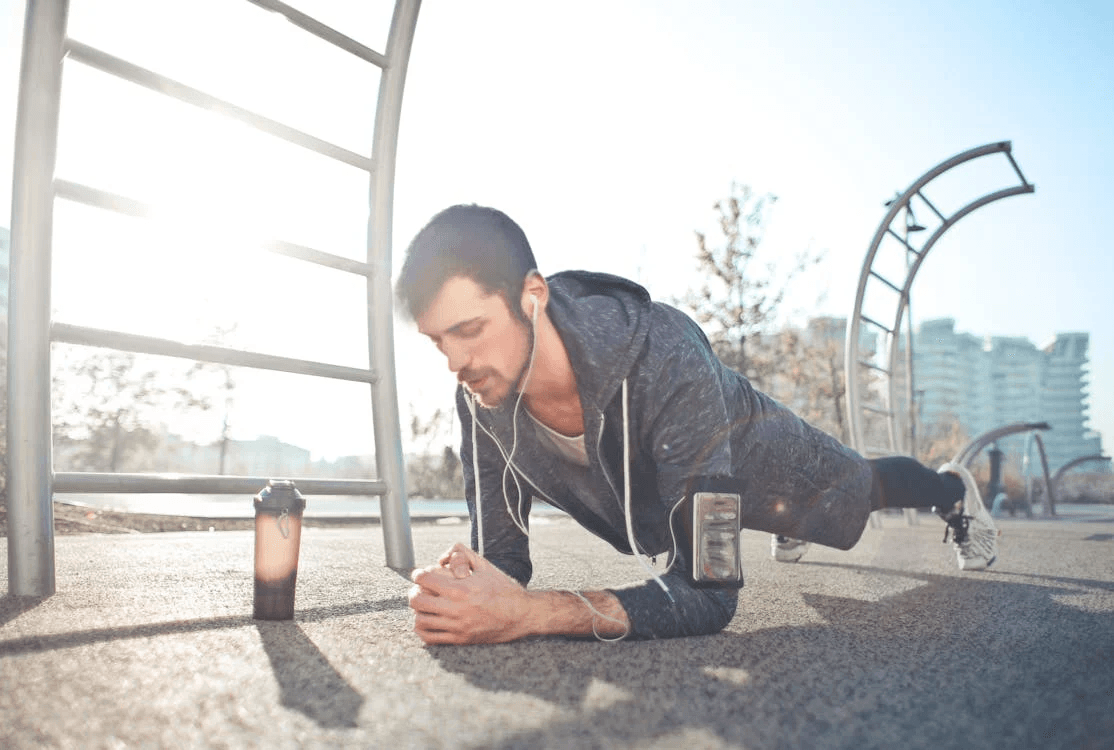
Tips on avoiding dehydration
The best way to avoid dehydration is to supply your body with the fluids it needs to support bodily functions and to replenish any fluid lost through breathing, sweating, urinating and bowel movements. Aim for at least your standard 1.5 -2 litres, and be mindful of other factors which might increase your needs from day to day, exercise, heat, etc. Here are some tips on how to up your water game and prevent dehydration:
Drink Water Before, During, and After a Workout
Before we start a workout, we should drink at least 16-24 ounces of fluid about 2 hours beforehand, then around 20 minutes before we start we should be aiming for another 8 ounces, during the workout, 8 ounces every 15 minutes and once we finish, we should be taking on board another 16-24 ounces of fluid ( 12 ).
Eat More Fruit & Vegetables
Many fruits and vegetables have a high water content, including:
- Melon
- Cabbage
- Celery
- Lettuce
- Cucumber
- Grapes
- Carrots
- Spinach
They also contain good amounts of salt and vitamins which can help prevent dehydration.
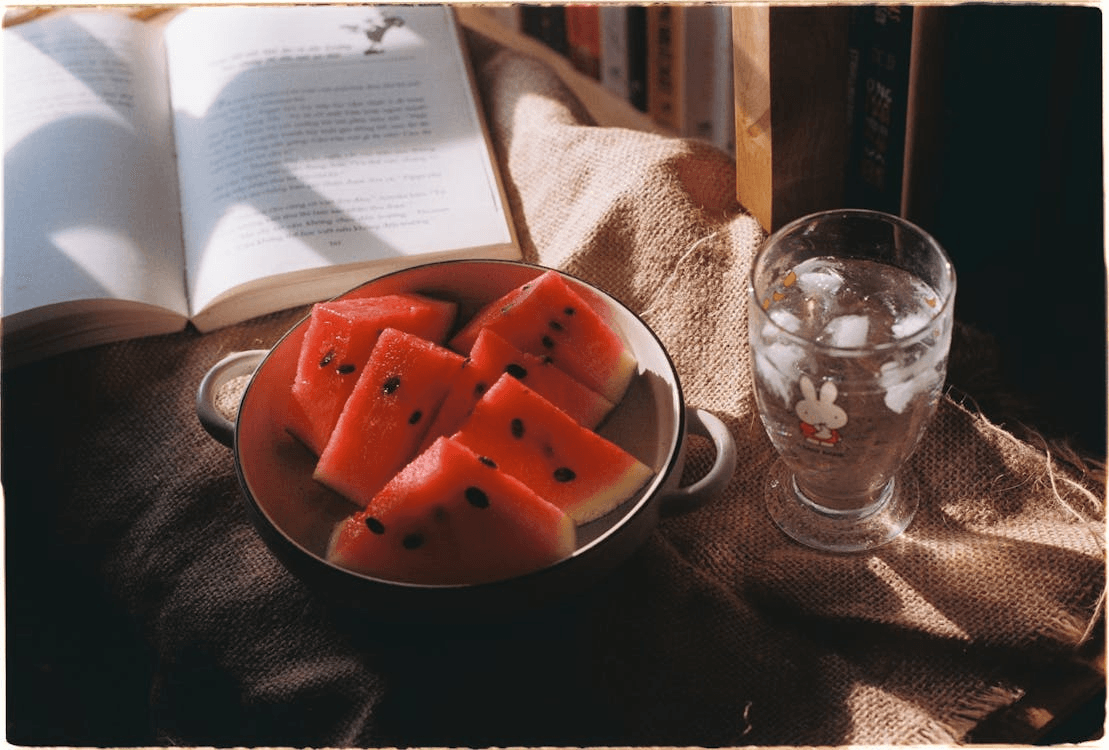
Make drinking a habit
It's best not to wait until you feel thirsty, as by then you're already starting to become dehydrated. Be water-aware, and get into the habit of having a drink at least every couple of hours.
Have a water bottle
Sometimes just having a water bottle can be the visual reminder you need to prompt you to drink more water. And with most water bottles coming in certain measurements, you can be aware of how much water you are taking in, and therefore aware of how much more you need to take in for the rest of the day. Make sure water is within easy reach day and night - take a water bottle with you wherever you go. There are lots of different sizes and shapes available to suit your plans.
Don't skip meals
Food is also a good source of fluids, so if you skip meals, remember that you're also reducing your fluid intake.
Limit alcoholic beverages
Sadly, a long cold beer doesn't really count towards your 8-a-day as alcoholic beverages can have a diuretic effect, so can actually dehydrate you.
Make drinking enjoyable
Many people struggle to drink water. If this is you, experiment with variations: sparkling water, cold water, hot water, or water at room temperature - many people find water easier to drink if it's not chilled. Add fruit to your water, such as oranges, limes and lemons. Cucumber, watermelon, strawberries and herbs are great options, too. Ideally water is best for hydrating your body, but other drinks like tea, coffee, milk and juices, and sodas can count towards your daily drinks quota. Be aware that these may also contain additional ingredients however, and will therefore be higher in calories. Tea, coffee, and fizzy drinks may also contain caffeine which can be dehydrating in excessive amounts. For caffeine, dehydration occurs when consuming around 250-300 mg- which is about 2-3 cups of coffee, and 5-8 cups of tea ( 13).
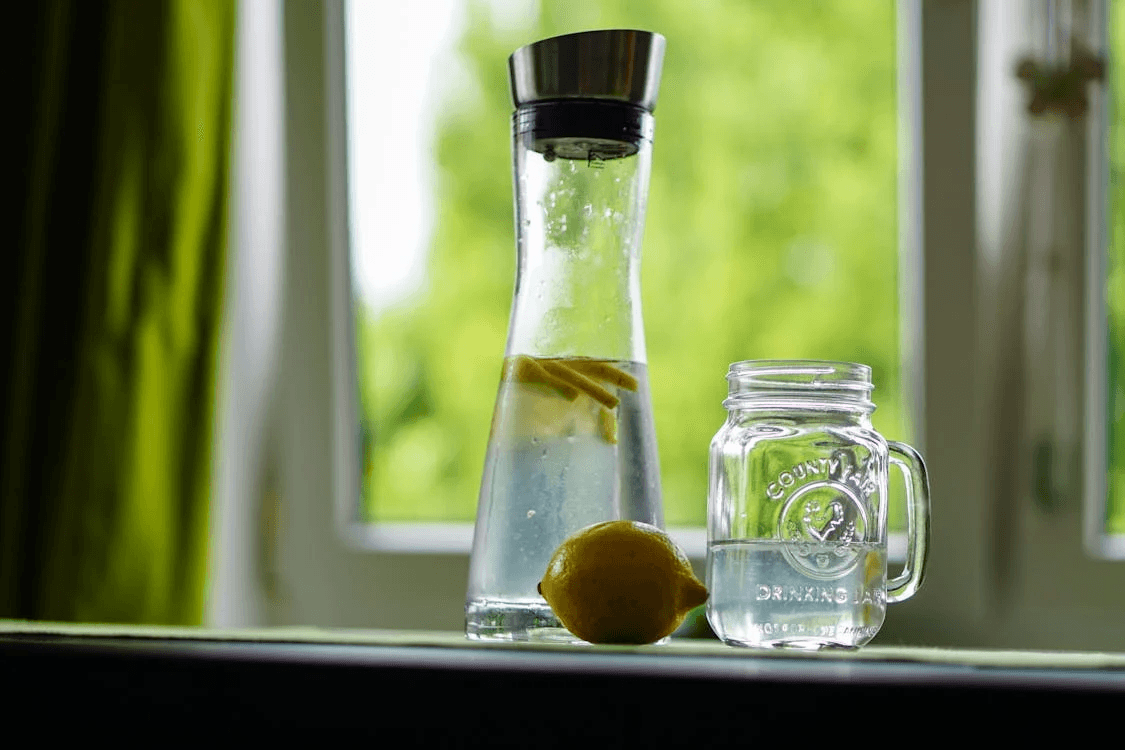
Key facts about water intake and dehydration
Hopefully, you now feel more informed about how to keep your body well-hydrated and why this is important. Here are some key takeaways:
- Aim to drink at least 6-8 glasses of water per day, and extra if you're losing fluids through perspiration etc. to avoid getting dehydrated
- Dehydration is when the body loses more fluid than it takes in, and drinking more fluids is the best way to stay hydrated and re-hydrate
- Be water aware - make drinking a priority throughout your day
If you enjoyed this article, read these other related articles on our blog:
How to stay fit if you sit 9-to-5
Author - Paulo Vaa, writer and podcaster
